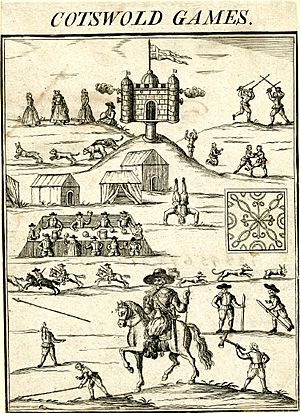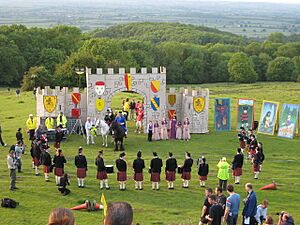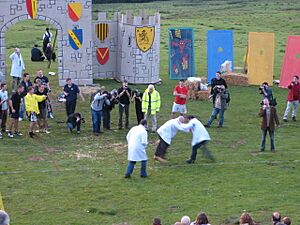Cotswold Olimpick Games facts for kids

Image from 1636 depicting the Cotswold Games. Robert Dover, founder of the games, is on horseback, carrying a wand.
|
|
| Abbreviation | Cotswold Olimpicks |
|---|---|
| Headquarters | Chipping Campden, England |
| Chairman | Andy Norton |
| Website | Robert Dover's Games Society |
The Cotswold Olimpick Games are a yearly festival of sports and games held in the Cotswolds region of England. They take place near Chipping Campden on the Friday after the Spring Bank Holiday. These games likely started in 1612 and have a long history, including times when they stopped and then started again. After being discontinued in 1852, they were brought back in 1963 and are still celebrated today.
The games were first organized by a local lawyer named Robert Dover. He had the support of King James I. Dover might have started the games because he believed physical exercise was important for defending the country. He also wanted to bring people from all parts of society together, whether rich or poor. Everyone, even royalty, attended the games at different times.
Contents
What Sports Are Played at the Cotswold Olimpicks?
The Cotswold Olimpicks feature many exciting events. In the past, these included horse-racing, coursing (hunting with dogs), running, jumping, dancing, and throwing a sledgehammer. There were also fighting events using swords and cudgels, quarterstaff (a long wooden staff), shin-kicking, and wrestling.
Besides the main sports, people could play games like chess and cards in special booths and tents. There was also plenty of food for everyone who came. A temporary wooden building called Dover Castle was built on a natural hill, now known as Dover's Hill. Small cannons were fired from the castle to signal the start of the events.
History of the Games: Stops and Starts
The games used to be held on the Thursday and Friday of Whitsun week, usually in May or June. In the 17th century, many Puritans did not approve of such festivals. They thought these events were linked to pagan traditions and especially disliked celebrations on Sundays or church holidays like Whitsun.
By the time King James died in 1625, many Puritan landowners had stopped their workers from attending these festivals. Growing disagreements between the King's supporters and the Puritans led to the English Civil War in 1642. This war caused the games to stop.
The games were restarted after the English Restoration in 1660. However, some critics felt they became less organized and more like a rowdy country festival. The games stopped again in 1852. This happened because the common land where they were held was divided up among local landowners and farmers. This land was then fenced off, meaning there was no longer a big open space for the games.
Since 1966, the Cotswold Olimpicks have been held every year on the Friday after the Spring Bank Holiday. Modern events include tug of war, gymkhana (horse riding games), shin-kicking, dwile flonking (a unique local game), motorcycle scrambling, judo, and morris dancing. The British Olympic Association has even recognized the Cotswold Olimpick Games as an early inspiration for Britain's own Olympic history.
Who Started the Cotswold Olimpicks?
The first Cotswold Olimpick Games likely took place in 1612. They were organized by Robert Dover, a lawyer. Not much is known about Dover's early life, but he was probably born in Norfolk between 1575 and 1582. He later moved to Saintbury, near Chipping Campden, with his family.
It's not clear if Dover created the games from scratch or took over an existing local event. However, the games had the full support of King James. King James believed that public games and exercises were good for people and helped them feel positive about their king.
Dover might have been interested in the games for military reasons, believing that physical fitness was important for the country's defense. He also hoped the games would bring rich and poor people together, creating more harmony in society. This idea made the event very popular. Poets of the time praised the games as a time of "social harmony and communal joy."
Endymion Porter, a member of King James's court, lived near Dover. King James even sent some of his own clothes to Dover to make him look special at the games.
In 1636, a collection of poems called Annalia Dubrensia (Annals of Dover) was published. These poems praised Dover and his work in organizing the games. Famous poets like Michael Drayton and Ben Jonson contributed. They saw the games as a way to refresh traditional English social life. By this time, the games were known as "Olimpicks," a name Dover approved of. This name connected the local games to the grand Olympics of ancient Greece, making them seem more important.
How Were the Games Organized?
The games were held on a natural hill called Dover's Hill (formerly Kingcombe Plain), above Chipping Campden. They took place on the Thursday and Friday of Whit-Week. Robert Dover himself led the games while riding a horse. He wore special clothes, including a coat, hat, feather, and ruff, which were given to him by King James. Both horses and people were decorated with yellow ribbons, which were Dover's special favors.
Tents were set up for important guests, who came from nearby counties like Gloucestershire, Oxfordshire, and Worcestershire. There was plenty of food for everyone. A poet named Nicholas Wallington wrote that Dover "spares no cost" and that "None ever hungry from these Games come home."
Each year, a temporary wooden building called Dover Castle was built. Cannons were fired from it during the competitions. Competitors were called to the hillside by a hunting horn. The events began with more cannon fire. Prizes included silver trophies for horse-riding events and possibly money for other sports.
Officials called "sticklers" refereed the contests. They got their name because they carried sticks to safely separate fighting swordsmen. This is where the phrase "a stickler for the rules" comes from! No scores or times were recorded for any events, as people back then weren't focused on breaking records.
People from all walks of life attended the games, from farm workers to nobles. Some traveled up to 60 miles to be there. Even Prince Rupert, a famous royal, attended in 1636.
Other Fun Activities
A musician dressed as the Greek poet Homer entertained the crowds, adding to the classical Olympic theme. There was also a maze, called a Troy Town, made from piled-up turf. Villagers would dance through it. People also played games like chess, Irish (similar to backgammon), and card games in booths and tents.
The games ended with a big fireworks display around Dover Castle.
The Games Return: 1951 to Today
Dover's Hill was bought by the National Trust in 1928. The games were briefly revived for the 1951 Festival of Britain. However, they didn't become a regular event again until the Robert Dover's Games Society was formed in 1965.
Since 1966, the games have been held every year, except for a few cancellations due to bad weather or animal diseases. Thousands of visitors come to watch. An actor dressed as Robert Dover arrives on horseback to open the games.
Modern events include tug of war, gymkhana, shin-kicking, dwile flonking, motorcycle scrambling, judo, piano smashing, and morris dancing. After dark, a bonfire is lit, followed by a torchlight procession to the town square in Chipping Campden, where the fun continues late into the night.
The British Olympic Association recognized Dover's games as an important part of Britain's Olympic history. A sports journalist named Ron Pickering said in 1972 that English rural sports and the work of people like Robert Dover had a big impact on the idea behind the modern Olympic Games. He noted that almost half the events in the modern Olympics are connected to British rural sports.
The games were cancelled in 2017 due to funding issues but returned in 2018. The 2019 games included a children's race, an adult championship race, and a tug of war. They also featured fireworks, a torchlit procession, marching bands, and cannons. The 2020 and 2021 games were cancelled because of the COVID-19 pandemic.
See also
 | Charles R. Drew |
 | Benjamin Banneker |
 | Jane C. Wright |
 | Roger Arliner Young |




